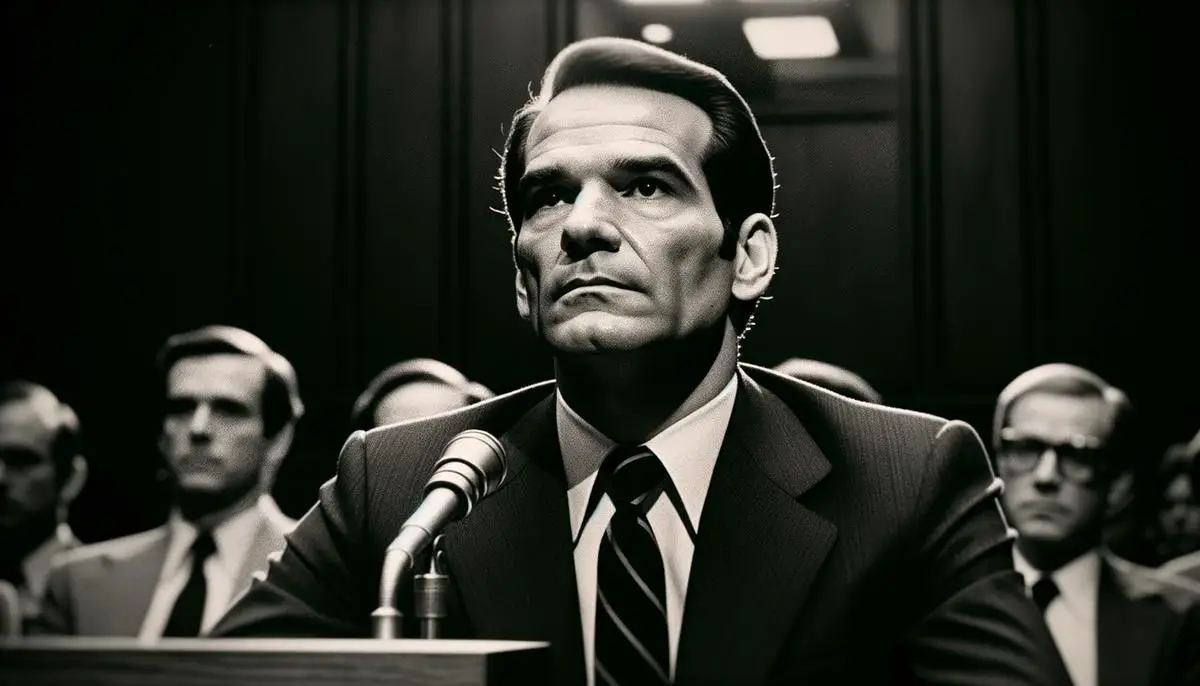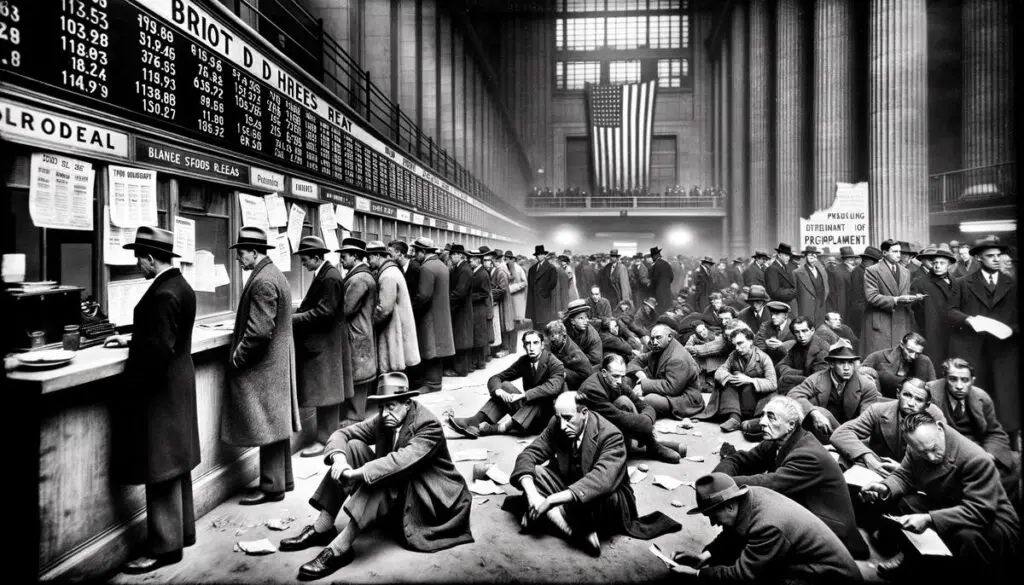The Break-In and Initial Cover-Up
On June 17, 1972, a night guard at the Watergate complex discovered tape over a door latch, leading to the arrest of five individuals caught in the act of a break-in. The arrested men were connected to higher powers, with one serving as security chief for Nixon's Committee to Re-elect the President (CREEP), suggesting a potentially nefarious political motive. The burglars carried sophisticated wiretapping devices, further indicating a well-orchestrated plan.
Despite initial attempts to minimize the incident as a "third-rate burglary attempt,"
mounting evidence suggested a deeper, far-reaching cover-up. The linkage between the burglary and Nixon's reelection campaign set off alarms about possible governmental abuse of power. Nixon himself engaged directly in the subterfuge, orchestrating a plan to supply "hush money" for the burglars' silence just days after the break-in.
As investigations deepened, a team of journalists, notably Bob Woodward and Carl Bernstein of The Washington Post, together with an FBI deputy director known as "Deep Throat," revealed a scandal rooted in paranoia and the desire for political espionage. While Nixon publicly maintained his ignorance, his private engagements involved direct orders to hinder investigations and strategize over damage control.
Converging investigations by journalists, Senate committees, and special prosecutors uncovered a relentless flow of incriminating evidence, forming tighter circles around the presidency. As external assaults on the cover-up proliferated, those once loyal to Nixon began to pivot towards self-preservation, prying open wider gaps in his armor.

Media Role and the Unraveling of Watergate
Bob Woodward and Carl Bernstein, working for The Washington Post, emerged as pivotal watchdogs during the unfolding chaos of the Watergate scandal. Their tenacious investigative journalism, fueled by an unprecedented secret informant known as Deep Throat, dramatically escalated the stakes.
Deep Throat, later revealed to be Mark Felt, the second-in-command at the FBI, provided critical information that guided the trajectory of Woodward and Bernstein's reports.1 These clandestine exchanges painted stark contours into a shadowy puzzle intersecting the highest echelons of governmental power.
Woodward and Bernstein's nearly daily revelations kept the story in the limelight, nudging it from the corners of criminal curiosity to a central political spectacle with broad national consequences. The sequence of disclosures echoed through the halls of Congress, becoming torchpoints for subsequent legal and political assertions aimed at a presidency mired in its own misdeeds.
The sway held by Woodward and Bernstein cannot be understated. They kept Watergate from slipping into obscurity, fostering a rigorous examination of presidential accountability. An engaged citizenry proved crucial, agitated further by the chilling evidence of deceit presented with stark transparency on media platforms.
Ultimately, the relentless spotlight from the press sparked a more introspective media landscape and nudged jurisprudence forward in adjudicating limits of presidential reach. The story of Watergate became a testament to the enduring scrutiny respectable journalistic undertakings can leverage against even the most fortified facades of power.
The Legal and Political Repercussions
The Senate Watergate Committee, formally known as the Select Committee on Presidential Campaign Activities, spearheaded a comprehensive investigation into the Watergate scandal. Televised hearings, which began in May 1973, captivated the nation's attention, underscoring the gravity of the allegations against some of the most powerful figures in U.S. politics.
John Dean, former White House Counsel, emerged as a central figure during these hearings. His bombshell testimony in June 1973, including his assertion that he told Nixon there was "a cancer growing on the presidency,"
was a pivotal moment, laying out a narrative of active involvement and cover-up at the very top of the administration.2
The discovery of a secret taping system in the Oval Office provided invaluable evidence. Initially resisting its release, Nixon was eventually forced by the unanimous ruling of the United States Supreme Court in United States v. Nixon to turn over the tapes.3 These recordings offered unrefuted evidence of Nixon's knowledge and participation in the cover-up.
Facing nearly certain impeachment and eroding congressional support, Nixon chose to resign on August 8, 1974, becoming the first and only U.S. president to resign from office.
The aftermath of Watergate had a deep and enduring impact on the U.S. political landscape. Trust in government hit an all-time low, and Gerald Ford, Nixon's successor, grappled with the legacy of the scandal. It ushered in a more cynical view of politics among Americans and shaped an expectation for greater transparency and accountability in government.
Watergate set several precedents regarding executive power, oversight, and ethical governance. It led to campaign finance reforms and new standards for transparency, including the Federal Campaign Act Amendments and the Ethics in Government Act.4 These legal scaffolds sought to restore public trust in political processes and laid out clear guidelines for ethical conduct in office.

Nixon's Tapes: The Smoking Gun
The turning point in unraveling the corruption at the heart of the Watergate scandal derived from the Oval Office's taping system. Established to record presidential meetings and calls for posterity, the tapes instead dramatically sealed Nixon's fate by providing a clear view into the duplicitous nature of his presidency.
It was during Nixon's intense negotiation of executive power versus the thirst for truth that he grudgingly handed over selected recordings in compliance with growing demand. Yet, what was meant as a maneuver to placate scrutiny further exacerbated his predicament. The disclosed recordings were mined for incendiary content, trailing closer to an unimaginable executive confession.
The phrase "smoking gun" found its modern context when, among these recordings, the evident proof of Nixon's involvement in the cover-up was starkly laid bare. A particular tape, from June 23, 1972, just six days after the infamous break-in, captured Nixon discussing the break-in and orchestrating a plan to instruct the CIA to halt the FBI's investigation.5 This confirmed his participation and cast a glaring light on his attempts to leverage national security apparatus against judicial scrutiny—a confrontation with the rule of law.
The release of this specific tape was a watershed, erasing the sheen of feigned innocence that Nixon's administration had projected. The revelation fractured his dwindling core of legislative backing, sweeping away stalwart defenders and destabilizing his fragile presidency. The Congress was galvanized into unified suspicion and action, deeply troubling any whispers of plausible deniability the President wished public perception to entertain.
Understanding that the tapes left no latitude for denial or evasion, Nixon's resignation was punctuated by an acknowledgment of indefensibility, shadowed by the acute irony that his maintained recordings aimed at safeguarding his presidential narrative had crystallized his downfall.
The Nixon tapes endure as stark monoliths to the churning undercurrent of how power, once unchecked, tails into ego's gorges—to exist irrevocably intertwined with Watergate's shadow and an eternal footnote on perilous presidential overreaches. The tapes encapsulated the pivot in primacies of accountability over authoritarian assurances—a transition from taped enigma to perpetual emblem in American governance history.

Long-term Impacts of Watergate
Watergate led to significant changes in American political life, particularly in campaign finance laws, journalistic practices, and public perceptions of government integrity and presidential power. The scandal reshaped the nation's expectations of political transparency and ethical conduct among elected officials.
In the aftermath of Watergate, Congress enacted amendments to the Federal Election Campaign Act in 1974. These reforms aimed to limit the influence of money on politics by requiring comprehensive disclosure of campaign financial records, setting contribution limits, and establishing the Federal Election Commission (FEC) to enforce the rules.1 The reforms were a direct response to the concerns over opaque and unaccountable campaign funding mechanisms revealed during the Watergate investigations.
Investigative journalism also underwent a transformation post-Watergate. The scandal highlighted the crucial role of the press in holding the government accountable. Inspired by the work of Woodward and Bernstein, a new generation of journalists pursued stories with greater perseverance and skepticism. Newsrooms across America began to prioritize investigative reporting, with dedicated units taking prominent roles in mainstream media operations.2
The Watergate scandal deeply shook the public's trust in government. The abuse of power and subsequent cover-ups at the highest levels led to a reevaluation of presidential infallibility and the historical deference afforded to the Oval Office. This cynicism extended to political processes in general, fostering a more skeptical electorate that demanded greater accountability and transparency from their leaders.
Watergate also taught lessons about the importance of continuous scrutiny and reform to maintain a healthy democracy. The unraveling of the scandal led to systemic reinforcements to prevent potential repetitions, emphasizing the need for ongoing vigilance and accountability.
The long-term impacts of Watergate continue to shape American politics and society. The scandal serves as a reminder of the importance of transparency, ethical governance, and the role of the press in safeguarding democratic institutions. It remains an instructive episode, highlighting the need for ongoing dialogue between past errors and future rectifications in the pursuit of a more accountable and transparent government.

- Watergate Scandal - April 23, 2024
- Vietnam War Protests - April 22, 2024
- US Founding Fathers - April 21, 2024



